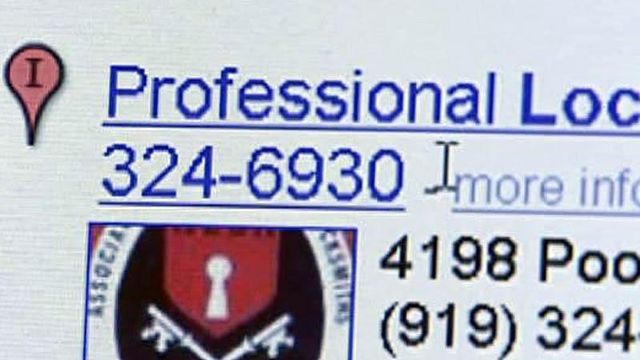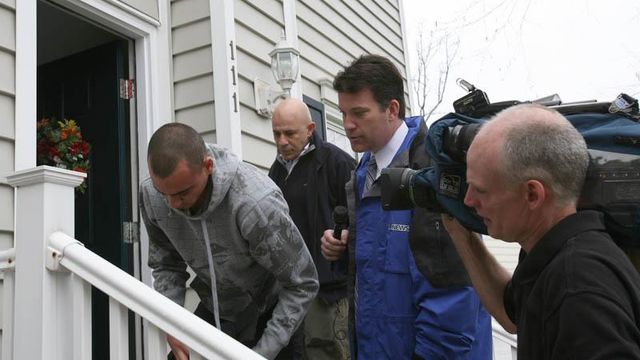Deceptive locksmith ads used to fool customers
A nationwide operation in which men posing as locksmiths prey on people locked out of their homes uses phony Internet ads to snatch customers from legitimate businesses, according to those in the industry.
Posted — UpdatedPaul Atkinson of Marshall's Locksmith Service inspected the locks and said a legitimate locksmith could have gotten the woman inside her home for less than $100.
Marshall's Locksmith lost business to the bogus operation after its ad on Google.com was intercepted, manager Debbie Atkinson said. Someone replaced the company's phone number in the ad with another listing.
"I just really feel like that it's fraud," Debbie Atkinson said. "It's pretty bad trying to help your (online ad) position when people are just going to take the listing away from you."
Another Google.com ad, for a company called Professional Locksmiths, lists its address as 4198 Poole Road in Raleigh, which is a wooded lot across the street from Marshall's Locksmith.
Derrick Johnson said one of his employees called Marshall's Locksmith to replace the locks at his Garner alarm business. He said he became suspicious when two men in street clothes came to the door claiming to be with ABC Locksmith.
"He had no identification whatsoever on him. He started getting a little irritable, and I told him he was going to have to leave the premises," Johnson said.
"It's a complete rip-off," said Laura Bussey of Bussey Locksmith Co., who is a member of North Carolina's Locksmith Licensing Board.
Once the fake ads dupe unsuspecting customers, Bussey said, the operation uses out-of-state call centers to dispatch unlicensed contractors to people's homes. The operation promises a nominal fee for its service, but the price quickly escalates when the phony locksmiths arrive, she said.
The two men caught by the WRAL News sting, for example, told the homeowner she had high-security locks that would cost extra to replace. They also drilled her deadbolt over her objections that it wasn't locked.
They were sent by SOS Locksmiths, which has prominent Internet ads for people searching for locksmiths in Raleigh. The company declined to comment on its practices and wouldn't even disclose the location of its office.
"They are saturating the market (with ads) and raking all the business their way and abusing all these customers," Bussey said of the nationwide operation.
Google is trying to combat fraud in its advertising listings, spokeswoman Elaine Filadelfo said, adding that business owners need to lock down their listings to prevent unauthorized editing and should report malicious activity to the company.
The Better Business Bureau has issued national warnings about the deceptive sales tactics used by the operation. But the BBB said the operation is hard to track because it uses several business names.
The North Carolina Attorney General's Office hasn't received enough complaints about bogus locksmiths to start an investigation, a spokeswoman said.
Licensed locksmiths said customers should ask to see a North Carolina locksmith license, which is required by law. They also should ask for references, double-check the company's office address and watch out for locksmiths who arrived in unmarked vehicles or without uniforms.
"I'd like to see these guys go away," Paul Atkinson said. "It puts a bad name on our industry, which it really shouldn't, because we're not all out to take everybody to the cleaners."
• Credits
Copyright 2024 by Capitol Broadcasting Company. All rights reserved. This material may not be published, broadcast, rewritten or redistributed.






